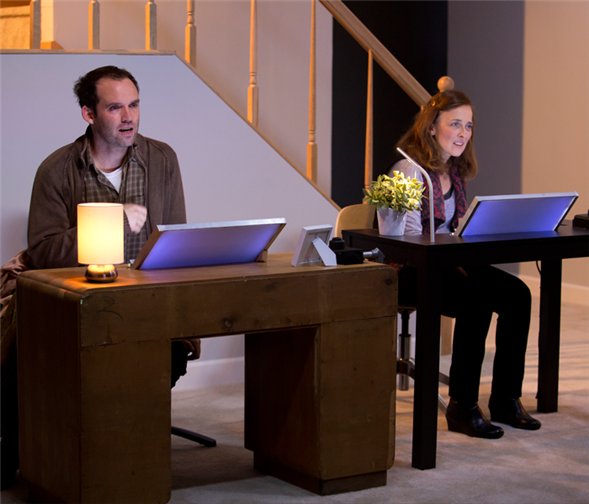Why Max Posner's play Judy is really about the present day
---
Let's forget for a moment that
Judy is set in the year 2040. First and foremost, the show, which is now at the New Ohio in a production from Page 73, is about three adult siblings who are learning to break their longtime patterns of isolation from each other and the world.
"That's one thing that has nothing to do with the future at all," Posner says. "It's actually about habit and the way you grow very accustomed to communicating with a familial relation, a sibling. The way that you're intimate with your family actually enables fragmentary conversation. There's such a backlog that even if it seems like things are offhand, they're made from decades of rehearsed behavior."
In other words, when we're with the people who know us best, we can sometimes stop talking to them in a meaningful way. A half-sentence or even a grunt can communicate a thousand different things, but as the play demonstrates, that can also lead to enormous misunderstandings. Take Timothy, who is startled to realize he's lost touch with his wife and daughter and doesn't quite know how to talk to his sisters about it. His problems are partly rooted in the fact that everyone keeps assuming things about each other without actually taking the time to investigate what's going on.
And yes, this leads to some outlandishly funny moments, like when Timothy dresses in a zany costume for a heart-to-heart with his pre-teen daughter. His rationale is that kids love opening up to folks in costume, so he dresses up without getting his own child's take on things. Similar hijinks erupt with his sisters, one of whom is dealing with her own maladjusted brood and the other who might be falling for her computer repairman.
These miscommunications also point to a larger cultural idea. Posner, who is in his twenties, sees similar interactions happening everywhere in his generation (and beyond). "There are fewer and fewer requirements for people to be in a room together or at a table together to have a relationship," he says. "You're walking through life alone, but you're also conversing with people who are close to you or that you need something from. So in
Judy, I wanted to portray that matter of spending time. It's about the way we're living separate lives while also being in conversation with each other."
And again, this extremely contemporary issue doesn't have anything to do with the year 2040. Yet Posner has set his play in the future for a reason.
"Sometimes, when you locate plays in our exact world, a certain literalism takes over the entire thing," he explains. "That can cut me out of the experience because I feel like I'm comparing my exact day to what I'm watching."
But if characters are in the future, he continues, when we're not exactly sure how society will work, then we might be more willing to accept unusual behaviors. And if we accept those behaviors, then it will be easier for us to reflect on them, analyze them, and relate them to our own lives.
"It's about making a theatrical container that expresses our habits," Posner says. "But the theatrical container won't necessarily be the exact thing we're used to."
As an example, he mentions the desks the characters use, which essentially function like large smartphones and have a tendency to break down. "I think the experience of something we rely on breaking, and then we have to interact with someone who comes to fix it, is very familiar to us. But I think that by setting it in the future, it doesn't feel like a wacky riff on, like, iPhones. It feels like something we can maybe ask the audience to accept."
The paradox, then, is that when things unfold in the future, they actually feel closer to home. Or as Posner says, "Removing the link between our exact world and this exact world actually makes the play more realistic to me."
---
TDF members are offered discounted tickets to many shows like this one. Click here to see all the member tickets that are currently available.
Follow Mark Blankenship at @IAmBlankenship. Follow TDF at @TDFNYC.
Photo: Danny Wolohan and Birgit Huppuch. (Credit: Jeremy Daniel)
